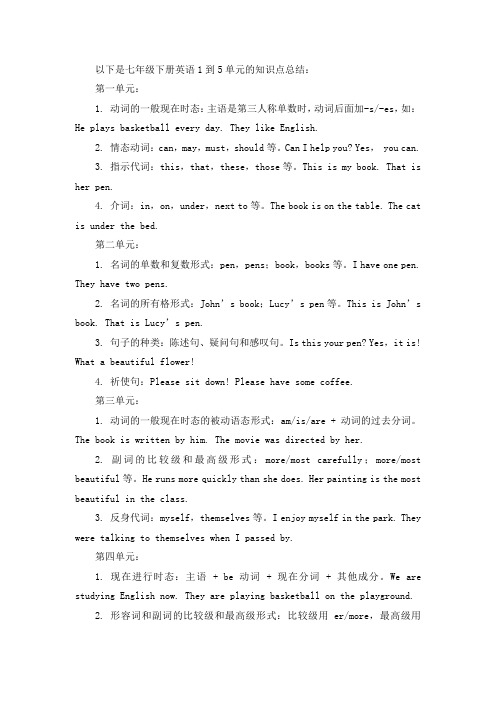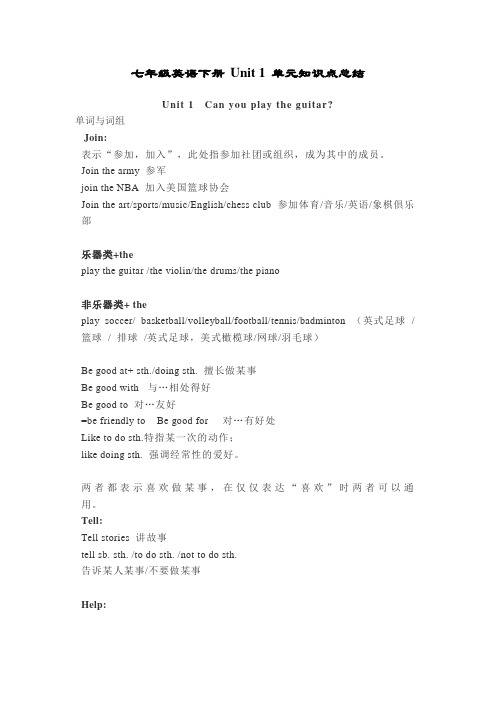七年级下册第一单元知识点总结
人教版七年级英语下册第一单元知识点总结

Unit One C an you play the guitar一.单词变换:1. 部分动词结尾加er就会变成干这个动作的人。
Eg. Sing(唱歌)----- singer(唱歌者)dance(跳舞)---dancer(舞者)Play(打;演奏)---play (运动员,演奏者)swim(游泳)---swimmer(游泳者)teach (教)--- teacher (教师)2.music n.(音乐)--- musician n.音乐家)piano n.(钢琴--- pianist n.(钢琴家)violin n.(小提琴)---violinist n.(小提琴家)二.重点短语:1. play chess 下国际象棋 2 . speak English 说英语 3. play the guitar 弹吉他4.want to do sth. 想做某事5. join the ...... club 加入...... 俱乐部6.tell stories 讲故事; the story telling club讲故事俱乐部7.be good at sth. / doing sth. 擅长于某事或做某事;be good with sb. 和某人相处得好; 善于应对。
,对。
有办法8.talk to sb. 跟...说talk with sb.和...交谈9. after school 放学后10. play the drums敲鼓;play the piano 弹钢琴;play the violin 拉小提琴11. make friends 结交朋友12. after school(放学后);13. like的用法:like sth. \ like to do sth. \ like doing sth(喜欢某物,喜欢做某事)14. play games with sb. 和某人一起玩游戏15.on weekends = on the weekend 在周末16. help sb.to do \ do sth .帮助某人做某事。
七年级下册语文人教版第一单元知识点

1.写作基础知识:
(1)词语的准确使用:要求学生熟练掌握一些基本词语的词义和用法。
(2)句子的基本要素:主语、谓语、宾语、定语、状语等的概念和用法。
(3)语段的组织:课文中的短文都是由一段段组成的,要求学生学会
整理材料,按照逻辑顺序组织语言。
2.课文及词语解析:
(1)课文主题和中心思想:理解课文的主要内容和中心思想,能够根
据课文进行复述和总结。
(2)生词解析:对一些生词进行解析和理解,如:寄予、承载、伴随等。
(2)文章类型:了解不同类型的文章,如记叙文、说明文、议论文等。
能够分辨文章的类型并读懂相关的内容。
4.课文中的情感:
(1)情感的表达:理解课文中的情感表达,如喜、怒、哀、乐等,能
够准确地描述人物的情感变化。
(2)对情感的理解:理解并分析人物的情感变化的原因和内在动机。
5.语言点:
(1)词语的比喻意义:理解一些较为抽象的词语的比喻意义,如:爱
情的火焰、蔚蓝的天空等。
(2)修辞手法:例如夸张、对比、排比、设问等,能够读懂课文中的修辞手法,并理解其作用。
以上就是七年级下册语文人教版第一单元的主要知识点总结,通过学习这些知识点,学生可以更好地理解和应用课文内容,提高自己的语文素养和写作能力。
七年级下册英语1到5单元知识点

以下是七年级下册英语1到5单元的知识点总结:第一单元:1. 动词的一般现在时态:主语是第三人称单数时,动词后面加-s/-es,如:He plays basketball every day. They like English.2. 情态动词:can,may,must,should等。
Can I help you? Yes, you can.3. 指示代词:this,that,these,those等。
This is my book. That is her pen.4. 介词:in,on,under,next to等。
The book is on the table. The cat is under the bed.第二单元:1. 名词的单数和复数形式:pen,pens;book,books等。
I have one pen. They have two pens.2. 名词的所有格形式:John’s book;Lucy’s pen等。
This is John’s book. That is Lucy’s pen.3. 句子的种类:陈述句、疑问句和感叹句。
Is this your pen? Yes,it is! What a beautiful flower!4. 祈使句:Please sit down! Please have some coffee.第三单元:1. 动词的一般现在时态的被动语态形式:am/is/are + 动词的过去分词。
The book is written by him. The movie was directed by her.2. 副词的比较级和最高级形式:more/most carefully;more/most beautiful等。
He runs more quickly than she does. Her painting is the most beautiful in the class.3. 反身代词:myself,themselves等。
七年级英语下册 Unit 1 单元知识点总结

七年级英语下册 Unit 1 单元知识点总结Unit 1 Can you play the guitar?单词与词组Join:表示“参加,加入”,此处指参加社团或组织,成为其中的成员。
Join the army 参军join the NBA 加入美国篮球协会Join the art/sports/music/English/chess club 参加体育/音乐/英语/象棋俱乐部乐器类+theplay the guitar /the violin/the drums/the piano非乐器类+ theplay soccer/ basketball/volleyball/football/tennis/badminton (英式足球/ 篮球/ 排球/英式足球,美式橄榄球/网球/羽毛球)Be good at+ sth./doing sth. 擅长做某事Be good with 与…相处得好Be good to 对…友好=be friendly to Be good for 对…有好处Like to do sth.特指某一次的动作;like doing sth. 强调经常性的爱好。
两者都表示喜欢做某事,在仅仅表达“喜欢”时两者可以通用。
Tell:Tell stories 讲故事tell sb. sth. /to do sth. /not to do sth.告诉某人某事/不要做某事Help:Help sb. to do sth. /help sb. with sth./ help sb. do sth. 帮助某人做某事Help yourself/sb. (to sth.)把某物(尤其是指食物,饮料等)拿给自己/某人can't help doing sth.情不自禁做某事Call at 用于打某人的电话 e.g. Call Mr.Brown at 293-7742Home:1. 表示动态概念。
意思是“回家”,“到家”。
人教版七年级下册英语Unit 1 知识点语法归纳总结

人教版七年级下册英语Unit 1 知识点语法归纳总结Unit 1 What’s the matter?1.短语归纳2.典句必背3.用法集萃(1)当别人心情不好,身体不适或遇到麻烦时,我们可以用如下表达表示关心:❖What’s the matter?❖What’s the matter with you?❖What’s wrong with …?❖What’s the trouble\problem with …?(2)英语中常用have描述身体的不适,此时have意为“患有”,常用结构:①have a + 疾病例:have a cold 感冒;have a fever 发烧;have a cough 咳嗽②have a + 身体部位-ache例:have a headache 头痛;have a toothache 牙痛③have a sore + 身体部位例:have a sore throat 咽喉痛;have a sore back 背痛(3)lie down躺下;tell lies/a lie 说谎(4)maybe & may be①maybe,“或许”,常用于句首,表示可能性,后加句子。
例:Maybe you are right.②may be,是情态动词+be的结构,意为“可能,也许”,后加名词、代词或形容词。
例:He may be angry.(5)sound like & sound①sound like+名词/代词/从句例:It sounds like you don’t know the truth. It sounds like a good idea.②sound+形容词,“听起来,好像”,例:The music sounds nice.(6)…when the driver saw an old man lying on the side of the road. ……这时司机看到意为老人躺在路边。
七下数学第一章知识点

七年级下册数学第一章的知识点主要包括有理数、相反数、绝对值、有理数的大小比较、有理数的加法、数轴以及相交线与平行线等内容。
1.有理数:正整数、0、负整数统称为整数,正分数和负分数统称为分数。
整
数和分数统称为有理数。
有理数包括正数、负数和零。
2.相反数:只有符号不同的两个数叫做互为相反数。
数轴上表示相反数的两
个点关于原点对称,零的相反数是零。
3.绝对值:在数轴上表示数a的点与原点的距离叫做数a的绝对值,记作
|a|。
一个正数的绝对值是它本身,一个负数的绝对值是它的相反数,0的绝对值是0。
4.有理数的大小比较:正数大于0,0大于负数,正数大于负数。
两个负数,
绝对值大的反而小。
5.有理数的加法:有理数的加法法则包括同号两数相加取相同的符号,并把
绝对值相加;绝对值不相等的异号两数相加,取绝对值较大的加数的符
号,并用较大的绝对值减去较小的绝对值。
6.数轴:规定了原点、正方向、单位长度的直线叫做数轴。
数轴的作用是所
有的有理数都可以用数轴上的点来表达。
7.相交线与平行线:本章主要介绍两条直线之间的相互关系及相对应的一些
定义,包括相交线、邻补角、对顶角、垂线等概念,以及学习图形的平
移。
以上是七年级下册数学第一章的主要知识点,希望对你有所帮助。
七年级下册英语unit_1-12单元全册知识点归纳与复习总结
七年级下册英语Unit 1 Can you play the guitar ?1、can+动词原形,它不随主语和数而变化。
(1)含有can的肯定句:主语+can+谓语动词的原形+其他。
(2)变一般疑问句时,把can提前:Can+主语+动词原形+其他?肯定回答:Yes,主语+can。
否定回答:No,主语+can't.(3)含有can的否定句:主语+can't+动词的原形+其他。
(4)含有can的特殊疑问句:特殊疑问词+can+主语+动词原形+其他?2、may+动词的原形。
(may为情态动词)一般疑问句是把may提前,肯定回答是:Yes,主语+may。
否定回答是:No,主语+mustn't。
或please don't。
join+某个组织,俱乐部,party,参军,党派等“加入”Join sb. “参加到某人中” join in (doing)sth “加入做......,参加某个活动” Join in=take part in +活动,比赛3、说某种语言:speak+语言4、play+球、棋、牌;play+the+乐器。
5、擅长于(做)什么:be good at +名词/动ing6、帮助某人做某事:help sb. (to ) do sth. help sb. with sth.7、我能知道你名字吗?May I know your name?8、想要做什么:want to do sth 例如:I want to learn about art.9、What club do you want to join?I want to join the chess club and the basketball club.10、What club does Tom want to join? He wants to join the swimming club .11、He can’t play the violin or the piano. Can you help kids with swimming?12、Why do you want to join the English club? Because I want to learn English well.Unit 2 What time do you go to school ?1、what time和when引导的特殊疑问句。
七年级下一二单元英语知识点总结
七年级下册第一单元复习基础短语及句子1.learn about 学习,了解2. ask a question问问题3. plan a trip 计划一次旅行4.a good chance for sb 对某人来说一次很好的机会5. send an e-mail发邮件 6. get one’s name from从......得到名字7. come back回来8. travel along the Silk Road沿着丝绸之路走9. the plan for ...的计划10. have enough time to do sth有足够的时间做某事11. along the way沿路12. arrive in 到达13. take a train to Xi’an 坐火车去西安14. come back to 回到......15. walk along 沿着.....走16.climb up爬上17. hit the drum 击鼓18.ring the bell敲钟19.take notes 做笔记20. sit on the horse坐在马上21. leave for 动身去某地22. go for a walk 散步23. go down the street沿着街走24. lead sb to ... 带某人去...25. wide and long 又宽又长26. ride a camel 骑骆驼27. fall off 落下,掉下28. fly home 飞回家29. on the trip 在旅途中30. hold the Olympics 举办奥林匹克运动会31. be over 结束1.May I take photos here? 我能在这照相吗?2.I will come back someday. 我将有一天会回来。
(someday 某一天,用在一般将来时态中)3.How long is the Silk Road? It is more than 6500 kilometres long . 丝绸之路多长?它超过6500千米长.4.Guess what!猜猜看!5.How exciting!多么令人兴奋啊!7.Welcome to Xi’an—the Walled city. 欢迎来到西安——城墙环绕的城市。
七年级下册数学一二单元知识点
七年级下册数学一二单元知识点七年级下册数学第一单元知识点:相交线与平行线一、相交线1.邻补角- 定义:两个角有一条公共边,它们的另一边互为反向延长线,具有这种关系的两个角,互为邻补角。
- 性质:邻补角互补,即两角之和为180°。
2.对顶角- 定义:一个角的两边分别是另一个角两边的反向延长线,这两个角互为对顶角。
- 性质:对顶角相等。
3.垂直- 定义:当两条直线相交所成的四个角中,有一个角是直角时,就说这两条直线互相垂直,其中一条直线叫做另一条直线的垂线,它们的交点叫做垂足。
- 性质:- 在同一平面内,过一点有且只有一条直线与已知直线垂直。
- 连接直线外一点与直线上各点的所有线段中,垂线段最短。
简单说成:垂线段最短。
- 点到直线的距离:直线外一点到这条直线的垂线段的长度,叫做点到直线的距离。
二、平行线1.平行公理及推论- 平行公理:经过直线外一点,有且只有一条直线与这条直线平行。
- 推论:如果两条直线都与第三条直线平行,那么这两条直线也互相平行。
2.平行线的判定- 同位角相等,两直线平行。
- 内错角相等,两直线平行。
- 同旁内角互补,两直线平行。
3.平行线的性质- 两直线平行,同位角相等。
- 两直线平行,内错角相等。
- 两直线平行,同旁内角互补。
4.命题、定理、证明- 命题:判断一件事情的语句,叫做命题。
命题由题设和结论两部分组成。
题设是已知事项,结论是由已知事项推出的事项。
- 真命题:如果题设成立,那么结论一定成立的命题叫做真命题。
- 假命题:题设成立时,不能保证结论一定成立的命题叫做假命题。
- 定理:经过推理证实得到的真命题叫做定理。
- 证明:在很多情况下,一个命题的正确性需要经过推理,才能作出判断,这个推理过程叫做证明。
七年级下册数学第二单元知识点:实数一、平方根1.定义- 如果一个数的平方等于a,那么这个数叫做a的平方根或二次方根。
即如果x² = a,那么x叫做a的平方根。
人教版七年级下册英语第一单元知识点汇总
人教版七年级下册英语第一单元知识点汇总◆重点短语◆重点句子◆重点单词变形二、语法知识点A部分知识点1、情态动词can的用法情态动词是动词的一种,表示说话人的语气和情态等,有一定的意义,不能单独做谓语,必须要和实义动词或者系动词连用构成谓语。
can是一个情态动词。
表示说话人的主观看法或语气,它没有人称和数的变化,也不能单独在句子中作谓语,但它可以与其后的不带to的动词不定式一起构成谓语。
❶情态动词can在陈述句中多表示做某事的能力“能,会”,或者推测“可能”。
eg:Her younger sister can speakEnglish. 她的妹妹会讲英语。
He can swim. 他会游泳。
He can be at home. 他可能在家。
❷ can在一般疑问句可以表示向对方提出请求或者自己要求给予许可。
eg:Can I help you? 我能帮你忙吗?Can you go to the picnic with us tomorrow? 明天你能和我们一起去野餐吗?❸ can的否定式和疑问式。
⑴情态动词变否定式很容易,在情态动词后直接加not。
遇到some变any。
can 的否定形式是cannot或can not,其缩略形式是can't。
eg:Lucy can't find herstorybook. 露西找不到她的故事书了。
Han Mei can't come to play with us because she is going to the movies.韩梅不能来和我们玩了,因为她要去看电影。
⑵情态动词变一般疑问句:①找情态动词②提到句首互换大小写③句末改成“?”④一、二人称互换,三人称不变,遇到some变any。
肯定回答用:“Yes,主语+情态动词.”;否定回答用:“No,主语+情态动词+not.”。
如是can,将含can的陈述句变为疑问句时,应直接将can移到主语前面,肯定答语为“Yes,主语+ can.”;否定答语为“No,主语+ can't.”。
- 1、下载文档前请自行甄别文档内容的完整性,平台不提供额外的编辑、内容补充、找答案等附加服务。
- 2、"仅部分预览"的文档,不可在线预览部分如存在完整性等问题,可反馈申请退款(可完整预览的文档不适用该条件!)。
- 3、如文档侵犯您的权益,请联系客服反馈,我们会尽快为您处理(人工客服工作时间:9:00-18:30)。
Unit 1 Where's your pen pal from?词汇学习1、world n. the earth, the planet that we live on,世界e.g. You can send an e-mail message to somebody on the other side on the world in a few seconds. 在几秒钟之内你就能发送一封电子邮件给世界另一头的某个人。
用法提示world 常与定冠词the 连用,表示“世界;世间;世界上的人”等意。
如:What was the world like before there were any people in it? 在人类出现之前世界是什么样子呢?One day I'd like to travel the world. 总有一天我要周游世界。
常用词组World Cup 世界杯;世界杯足球赛all over the world 全界;普天下this world 今世;今生相关词worldly adj. 世间的world-famous adj. 闻名世界的2、language n. a language is the speech of a particular area or country,语言e.g. What is the main language in Brazil? 巴西的主要语言是什么?用法提示说、学习、会讲某种“语言”,只用该语言的具体名称即可,不必再加language。
如:I know English. 我会英语。
而不说:I know English language.近义词speech n. 说话;说话的能力e.g. She is good at speech. 她擅长演说。
常用搭配:bad language 脏话;骂人话the Chinese language 汉语the English language 英语world language 世界语body language 身体语言working language 工作语言written language 书面语言spoken language 口语the Chinese language 汉语the English language 英语world language 世界语native language 母语foreign language 外国语finger / sign language 手语mind your language 注意你的语言近义词:speech n. 说话;言语;演讲3、live v. you live somewhere if that is where your home is,生活,居住e.g. She lives in Beijing, but the rest of her family live in Shanghai. 她住在北京,家人则住在上海。
用法提示live 可表示“居住”的意思。
如果问Where do you live?主要是问你“居住和生活”的地方,往往与home相关。
如果要表示在旅馆或朋友家暂住几天,应用stay,而不能用live。
如:She lives about ten miles from my house. 她的住处离我家大约有十英里远。
Where will you stay while you are in London?在伦敦时你住在哪儿?近义词stay v. 住;留e.g. They stay at a hotel. 他们住在旅馆。
常用词组live in a town 住在镇上live by 住在……附近live on 靠……生活life n. 生命;生活living n. 生活4、country n. a land with its own government and often its own language 国家;国土示例The company has branches in 15 countries. 这家公司在十五个国家有分公司。
用法点击country是可数名词,表示“国家”,侧重“疆土”之意,如:He loves his country. 他热爱自己的国家。
country前面加the还可以表示“郊外;乡村”,相当于countryside,如:I've always wanted to live in the country. 我一直想在乡下。
辨析country,nation,state和land这四个词在作“国家”解时是近义词,但侧重点不同。
country侧重版图、疆域,意为“国家;国土”。
nation 侧重人民、国民、民族,意为“民族;国家”。
state侧重政权、政体,意为“国家;政府”。
land意为“国土;国家”,带有感情色彩,多用于文学作品中。
词汇拓展常用搭配:in western countries 在西方国家mother country 祖国developing country 发展中国家developed country 发达国家country life 乡村生活country girl 乡下女孩country music 乡村音乐all over the country 全国名人名言:"And so, my fellow Americans, ask not what your country can do for you; ask what you can do for your country."(John Kennedy, 35th US president)“我的美国同胞们,不要问你的国家能为你做什么;而要问你能为自己的祖国做些什么。
”(约翰·肯尼迪,美国第35任总统)相关词:countryside n. 郊外;乡下;农村近义词:nation n. 国家;民族state n. 国家;政府land n. 国家;国土5、live v. you live somewhere if that is where your home is 生活;居住示例She lives in Beijing, but the rest of her family lives in Shanhai. 她住在北京,家人则住在上海。
用法点击live常用作不及物动词,表示“居住”意思。
如果问Where do you live? 主要是问你“居住和生活”的地方,往往与home有关。
如:She lives about ten miles from my house. 她的住所离我家大约有十英里远。
如果要表示“在旅馆或朋友家暂住几天”,应用stay,不能用live。
如:Where will you stay while you are in London? 在伦敦时你将住在哪儿?除非用以表示临时居住,或强调现在居住,通常live不用进行时形式,如:He's living in Beijing now, but will move to Wuhan soon. 他现在住在北京,但很快就要到武汉了。
live还可以用作及物动词,表示“过……的生活”,如:He is living a happy life. 他过着幸福的生活。
这句话也可以说He is living happily.词汇拓展常用搭配:live in town 住在镇上live in the country 住在乡下live on 靠……生活live a happy life 过着幸福的生活live abroad 住在国外谚语:Live and let live. 待人宽容如待己Live and learn. 活到老,学到老。
相关词:life n. 生命;生活 living n. 生活lively adj. 活泼的;精力充沛的近义词:stay v. 暂住;停留语言要点--- Where is your pen pal from?--- He's from Australia.--- What language does she speak?--- She speaks English.--- Where is Sydney?--- In Australia.--- I like going to the movies and playing sporUnit 2 Where is the post office?1、pass v. you pass a place when you go past it,通过e.g. I pass the library on my way to school. 我去学校的路上经过图书馆。
用法提示pass 作动词时表示“经过”。
如:Turn right after passing the post office. 经过邮局后向右转。
注意pass的基本含义为“经过”,其后所跟宾语不同,意义也不同。
pass an ocean,pass a desert 中的pass 作“渡过;穿过;超过”解;pass a city,pass a village,pass a street 中的pass 却是“从……的旁边经过”的意思。
但表达“穿过”,应用pass through 或pass along来表示,所有介词要试后面的宾语而定。
如:The tramp passed along the street, followed by a group of naughty boys. 部队穿过街道,后面跟着一群调皮的孩子。
近义词overtake v. 超过e.g. A police car with flashing lights was overtaking all the other cars. 一辆闪着警灯的警车超过了其他所有的车子。
常用词组pass away / pass on 逝世;过世pass sb. / sth. by 不注意;忽视pass for sb. / sth 被认为;被当作pass through 通过pass over 忽视;不注意相关词passable adj. 可通过的passage n. 通过;通道passing adj. 经过的;目前的;短暂的2、hope v. you hope something when you want it to happen, or to be so,希望;盼望;期待e.g. We are hoping for fine weather for your trip. 我们希望此次旅行能有个好天气。
